by Lacey Cooke | Jun 16, 2019 | 01 What's New, Records & databases
Featured this week are new and updated records for South Africa. The all-free site FamilySearch has two new and one updated collection for South Africa including death and probate records and passenger lists. Ancestry.com also has an updated collection of church records going back to the 17th century. Also new at Ancestry.com are four genealogy records collections for Essex, England.

Featured: South Africa Genealogy Records
If you have ancestors that lived in South Africa, you may already be familiar with some of the challenges of researching them. And if you’re new to genealogy or to your ancestors that lived in South Africa, you might be in for a surprise when it comes to records: census records aren’t available! They are routinely destroyed after being abstracted and thus not available to the public.
So where’s the best place to start looking? Most genealogy experts will tell you to start with death notices. A death notice is different than a death certificate, in that it’s not an official document. Rather, it is a document provided by next of kin, friends, or associates of the deceased. Information provided may not be 100% accurate or reliable, but it can often provide really helpful details and a glimpse into the person’s life.
FamilySearch as a new collection of South Africa, Orange Free State, Probate Records from the Master of the Supreme Court, 1832-1989. There are over 300,000 records in this set, and the most useful records in the collection are the death notices, which give detailed information. The probate records usually have multiple pages and are included in a probate file, which is identified by a probate number.
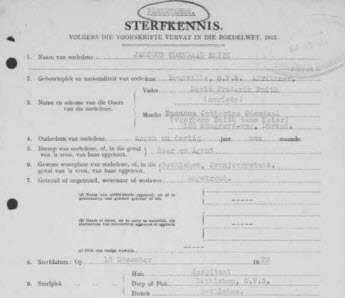
When a person died, the nearest relative or other connection should have completed a death notice and sent it to the Master of the High Court within 14 days of the death. These records might tell you the deceased’s name, birthdate and place, marriage status, parents’ names, the names of their children, information about property and wills left, and more.
There is an updated collection of actual death certificates at FamilySearch, which is the
Transvaal, Civil Death, 1869-1954 collection. “Death certificates are arranged chronologically and alphabetically by place and include full name, parent’s name if under the age of ten, mother’s residence, age, sex, birthplace, marital status, occupation, whether pensioner or pensioner’s dependent, place and date of death, residence, place of burial, cause and duration of death, and background of informant. For the years 1899-1902, records are arranged separately by internment camp and district where death occurred.”
If you’re an Ancestry.com subscriber, you can also check out the recently updated collection of
Dutch Reformed Church Registers, 1660-1970. This collection contains records from various locations which were part of historic Cape Colony, including Namibia, Cape of Good Hope province and Transvaal province. Record coverage will vary depending on location. It is also available at
FamilySearch.
Essex, England
Ancestry.com has four new collections of genealogy records for Essex, England. These BMD records date back as far as the 16th century and may hold important details about the lives of your ancestors living in Essex.
Church of England Births and Baptisms, 1813-1918: “Children were usually baptised within a few days or weeks of birth. The records generally include when the baptism took place and in what parish, child’s Christian name, parents’ given names and the family surname, residence, father’s occupation, and who performed the ceremony. Sometimes you’ll find additional details such as date of birth. Early records may contain less detail.”
Church of England Marriages, 1754-1935: “Couples were usually married in the bride’s parish. Marriage records typically include the bride and groom’s names, residence, date and location of the marriage, names of witnesses, condition (bachelor, spinster, widow, or widower) and the name of the officiant. Some records may also include the father’s name and occupation.”
Church of England Deaths and Burials, 1813-1994: “Burials took place within a few days of death. Records generally list the name of the deceased, residence, burial date, and age at death.”
Church of England Baptisms, Marriages and Burials, 1538-1812: “This collection contains images of Church of England parish registers of baptisms and burials during the years 1538–1812, and marriages during the years 1538-1754 from Essex, England.”
Get more new and updated records every week!
 Each week we round up the new and updated genealogy records collections for you in a helpful article so you can jump right into researching! Our free weekly email newsletter always has the latest records round up article, as well as other featured articles on genealogy methodology, inspiration, tips and tricks, and more. Plus the newsletter also lets you know where there is a new episode of The Genealogy Gems Podcast, new videos, and updates on news and events. And best of all it’s free! Sign up today to get our email newsletter once a week in your inbox.
Each week we round up the new and updated genealogy records collections for you in a helpful article so you can jump right into researching! Our free weekly email newsletter always has the latest records round up article, as well as other featured articles on genealogy methodology, inspiration, tips and tricks, and more. Plus the newsletter also lets you know where there is a new episode of The Genealogy Gems Podcast, new videos, and updates on news and events. And best of all it’s free! Sign up today to get our email newsletter once a week in your inbox.

About the Author: Lisa Louise Cooke is the producer and host of the Genealogy Gems Podcast, an online genealogy audio show and app. She is the author of the books The Genealogist’s Google Toolbox, Mobile Genealogy, How to Find Your Family History in Newspapers, and the Google Earth for Genealogy video series. She is an international keynote speaker and the Vice President of the Genealogical Speakers Guild.
Disclosure: This article contains affiliate links and Genealogy Gems will be compensated if you make a purchase after clicking on these links (at no additional cost to you). Thank you for supporting Genealogy Gems
by Lisa Cooke | Aug 23, 2016 | 01 What's New, Conferences
The Federation of Genealogical Societies (FGS) Conference for 2016 is “Time Travel: Centuries of Memories” and will be held in Springfield, Illinois. See what your future holds by learning about the past. Genealogy Gems will be there, and you’re going to love our line-up of free 30-minute classes in the exhibit hall (booth #200). Plus, enter to win our Grand Prize drawing! Here are all the details.
Make Your Future Whatever You Want, But Make it a Good One

JMortonPhoto.com & OtoGodfrey.com [CC BY-SA 4.0 (http://creativecommons.org/licenses/by-sa/4.0)], via Wikimedia Commons
This Federation of Genealogical Societies Conference will benefit the novice, the professional, and anyone in between. With over 160 sessions and 72 expert speakers from all over the world, you will be inspired to reach greater heights in all things genealogy.
Each day, a new set of classes will guide you through:
- the U.S. Midwest (regional track)
- the United Kingdom (British Isles and Commonwealth track)
- the continental European research (ethnic track), to give you the latest and greatest in genealogy research.
If you missed early registration, that’s okay. Walk-in registration is available by clicking here. Enjoy all four days of inspiring classes, only attend a day or two, or just meander around the exhibit hall.
Free Stuff in the Exhibit Hall
The exhibit hall is always a favorite place to network and socialize with your genealogy buddies. Wander from booth to booth to see what the future holds for genealogists and gather up all the fun and free swag, too.
Most importantly, Lisa wants to see you for our free sessions that are back by popular demand! With such a positive response last year, Genealogy Gems will once again be hosting a series of free presentations at this year’s FGS conference. Join us in our Genealogy Gems Theater in booth #200 in the exhibit hall. Our 30-minute information-packed sessions will help you think outside the box for greater genealogy success.
Attend any of our sessions and sign-up to receive our free e-book of handouts for all the sessions. Want to plan ahead so you don’t miss a thing? Glance over the schedule below (click the button to download the schedule) and mark your can’t-miss sessions. (Not able to attend? Stay tuned because we will be announcing which sessions will be broadcast live over Periscope for free.)

BONUS: Join Lisa in the FGS theater area of the exhibit hall
Saturday at 12:10 for
Top Google Search Strategies for Genealogists
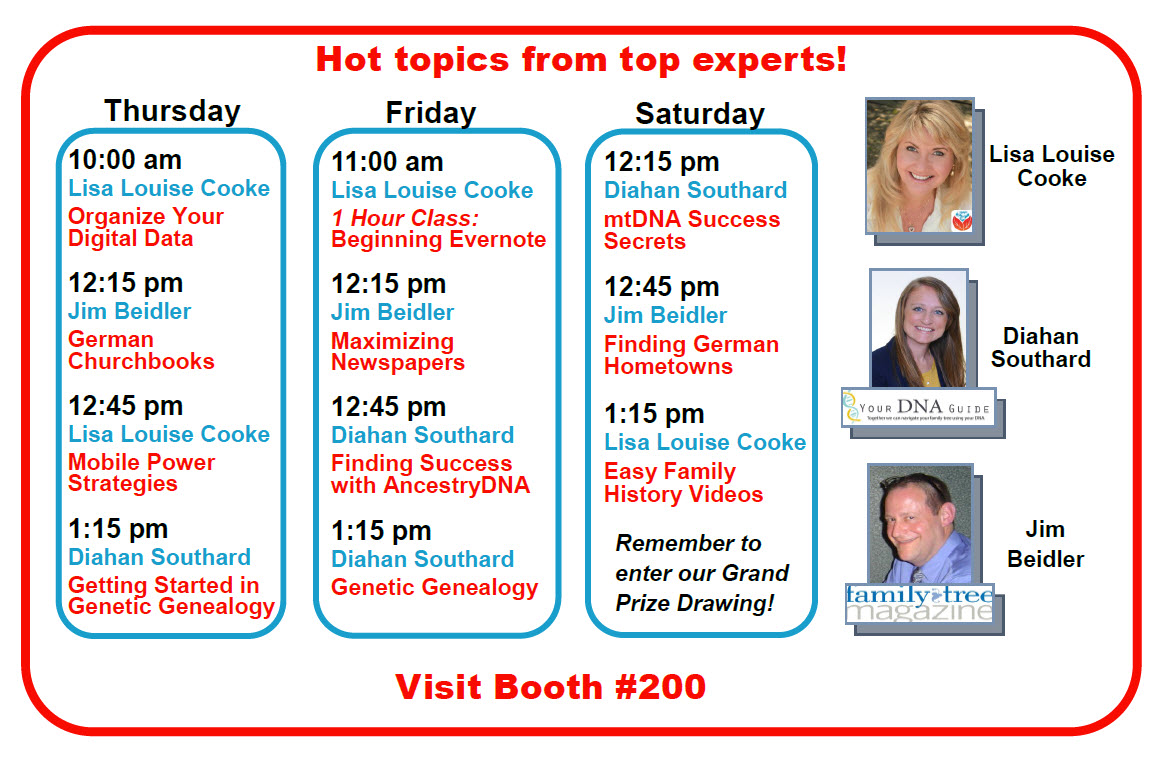
Grand Prize Drawing: Total Retail Value over $210
Presenters at the Genealogy Gems Theater have pitched in for this year’s Grand Prize drawing. The winner will receive:
…from Lisa Louise Cooke’s Genealogy Gems
…from Your DNA Guide Diahan Southard
…from Family Tree Magazine: an e-book bundle valued at about $100
Click here for the Grand Prize entry form, which also gets you the free e-book with all the session handouts. Drop the entry off at booth #200. The winner will be notified by email.

Lisa will of course be presenting lectures during the daily sessions. Jump on over to our website page for even more information about the FGS Conference.
We’re looking forward to seeing you there, friends!
by Lisa Cooke | Mar 29, 2017 | 01 What's New |
Alaska genealogy researchers celebrate an important milestone. It’s the 150th anniversary of the Alaska Purchase. This special commemoration includes a photography exhibit, musical program, and much more. Keep reading to learn more about resources for Alaska genealogy.
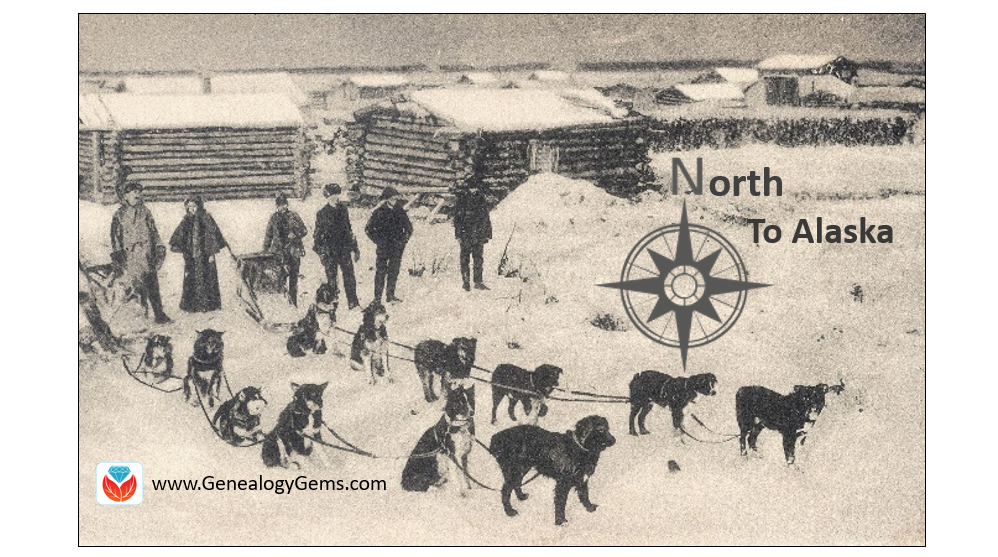
The National Archives is celebrating the sesquicentennial (150 years) of the Alaska Purchase with a special Hidden Treasure Alaska panoramic photography exhibit at the National Archives at College Park. It will also include a presentation by the exhibit curator, a musical program at the National Archives Museum in Washington, DC, and a loan to Polar Bear Garden exhibit at the Anchorage Museum. The National Archives programs and exhibit are free and open to the public.
The Musical Program
The musical program will be held on Thursday, March 30, at 7:30 p.m. at William G. McGowan Theater, Washington, DC. On March 30, 1867, U.S. Secretary of State, William Henry Seward, signed the Alaska Treaty of Cession that purchased Russian America. To commemorate the life and contributions of Seward, the State of Alaska is sponsoring a performance of the Alaska chamber group, Wild Shore New Music. Wild Shore will perform the work of living composers who have found inspiration through their experiences with the natural beauty and indigenous cultures of Alaska. Reservations are recommended and can be made online.
The Exhibit
The Hidden Treasure exhibit will be at the National Archives at College Park, MD, on the lower level. Hidden Treasure dramatically captures the beauty of Alaska, as captured on film by U. S. Geological Survey (USGS) topographers from 1910-1932. These extraordinary images of more than 6,000 panoramic photographs from the collection were used, but then stored and remained unseen for decades. Thanks to the research, work, and photographic skill of National Archives expert Richard Schneider, these images can now be seen by the public in their original panoramic format for the first time. These images capture work-life in the Alaskan wilderness, surveying techniques, towns, and geological formations, such as the Columbia Glacier. See Richard Schneider’s related Prologue Magazine story: The Alaskan Frontier in Panorama – How the National Archives Preserved Early 20th-Century Photographs.
Schneider will discuss these historic panoramic photographs of the Alaska Territory in his presentation on Wednesday, April 12th at 2 p.m. EST. You may see it live streamed at the William G. McGowan Theater & YouTube.
Polar Bear Garden
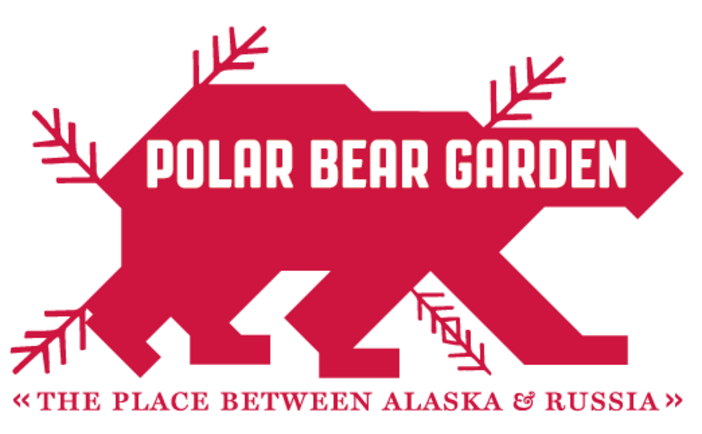 Beginning March 3rd through September 17, 2017, The Polar Bear Garden exhibit will be on display at the Anchorage Museum in Anchorage, Alaska.
Beginning March 3rd through September 17, 2017, The Polar Bear Garden exhibit will be on display at the Anchorage Museum in Anchorage, Alaska.
Archival and contemporary photographs combined with nesting dolls, cartoons, feature-length films, and Cold War propaganda will take viewers on a journey between Alaska and Russia since the purchase. It will further explore stereotypes, language, storytelling, boundaries, and crossings. The exhibit highlights are on rare loan from the National Archives and include the original cancelled check and President Andrew Johnson’s Ratification of the Treaty. More information about the Polar Bear Garden can be found online.
Alaska Genealogy
Your Alaskan heritage will likely include stories of great strength and perseverance. To begin your Alaska genealogy research, you may wish to review the FamilySearch Wiki article titled Alaska, United States Genealogy. In it, you will learn important tips like the fact that Alaska is not divided into counties, as nearly all the other states are. Instead, Alaska is divided into boroughs.
There is also a free guide on the wiki titled Step-by-Step Alaska Research, 1880-Present that you may particularly helpful. Among other things, it will help you located birth, marriage, and death records; wills and probates; and naturalization and immigration records.
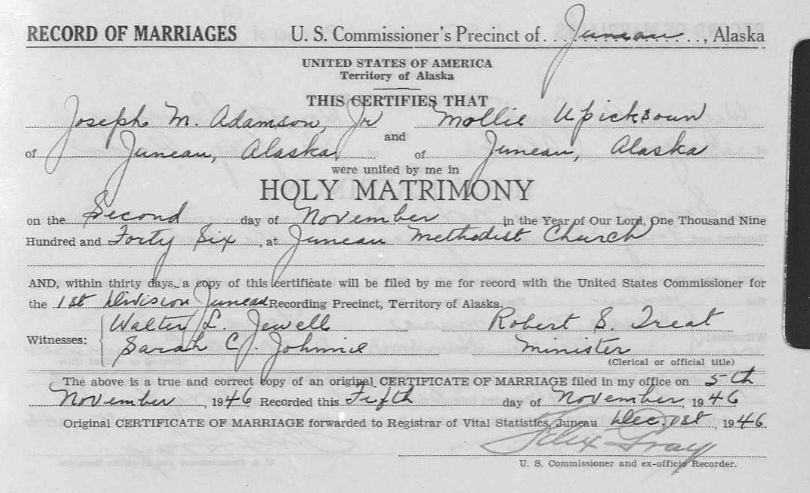
Marriage record found online at FamilySearch.org in collection titled “Alaska, Vital Records, 1816-1959”
Additionally, the Alaska State Archives have resources available. They hold many records that contain information on individuals such as:
Lastly, check out the Alaska Genealogy online guide provided by the Alaska State Library. This basic guide of Alaska related genealogy resources is not intended to be comprehensive, but it is certainly a step in the right direction. Sources for several of the boroughs may be available in other Alaska libraries or through interlibrary loan at your local library. They include:
More Resources for Alaska Genealogy Research
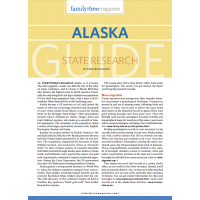 The Alaska State Research Guide Digital Download by Family Tree Magazine is a digital download you will want to have for your genealogy library. Trace your Alaska ancestors with the advice and resources in this four-page download. It includes:
The Alaska State Research Guide Digital Download by Family Tree Magazine is a digital download you will want to have for your genealogy library. Trace your Alaska ancestors with the advice and resources in this four-page download. It includes:
- a how-to article detailing Alaska history and records, with helpful advice on tracking your family there
- the best websites, books and other resources for Alaska research, handpicked by our editors and experts
- listings of key libraries, archives and organizations that hold the records you need
- descriptions of the top historic sites for learning about your ancestors’ lives and times, including visitor information
- timeline of key events in the state’s history
- full-color map to put your research in geographical context
Happy hunting…or should I say mushing!
by Lisa Cooke | Jun 24, 2014 | 01 What's New, Family History Podcast, Listeners & Readers
Family History: Genealogy Made Easy Podcast
with Lisa Louise Cooke
Republished June 24, 2014
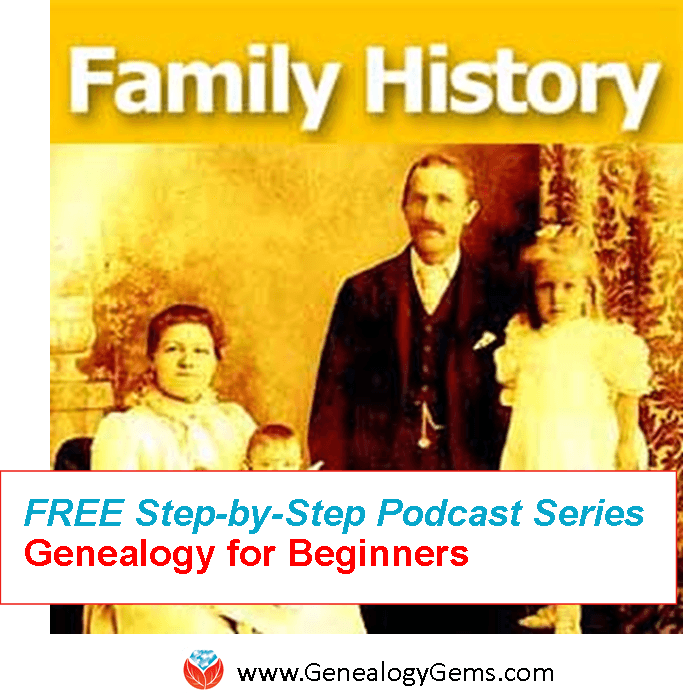
Listen to the Family History: Genealogy Made Easy podcast by Lisa Louise Cooke. It’s a great series for learning the research ropes and well as refreshing your skills.
https://lisalouisecooke.com/familyhistorypodcast/audio/fh37.mp3
Download the Show Notes for this Episode
Welcome to this step-by-step series for beginning genealogists—and more experienced ones who want to brush up or learn something new. I first ran this series in 2008-09. So many people have asked about it, I’m bringing it back in weekly segments.
Episode 37: Your Genealogy Questions Answered, Part 2
Today’s show is all about YOU! Just like Episode 36, this episode is made up completely of your emailed questions, comments and stories. Joining me on today’s episode to read your emails again is my daughter, Lacey Cooke.
Question: Is there a way to get iTunes to download all of the podcasts instead of just the most recent ones? I thought I saw it on the website somewhere but now I can’t find it. –Melanie Armstrong
Answer: (updated since the podcast originally aired): In your iTunes LIBRARY, on the line where the Genealogy Gems Podcast is listed click the GET ALL button. This will download all the past episodes to iTunes on your computer, to be listened to at your convenience. Downloading will take several minutes. You will see a little spinning orange circle to the left of the podcast name as it downloads. Once the episode is downloaded the text will turn from gray to black. Double click the episode and it will start to play after a moment or two.
Question: I use the free forms at Family Tree Magazine’s website. Do you keep your old Family Group Sheets on file so you can double check them later? – R. Butler
Answer: I love all those free forms at Family Tree Magazine! I’ll tell you the truth, I decided to throw mine away. I transcribed everything into my database and threw away the paper. Everything is properly sourced there, which is key. I avoid duplicating efforts, which has happened to me when looking back at old paper forms. If I need to double-check things, I do it from the actual sources—the birth or death certificate or interview—not from the family group sheet. The only exception is if the group sheet is part of a brick wall case file that I haven’t solved yet. I keep them until the case is solved, and then the cited answers go into the database.
Question: How do you know when records/indices are complete? I have been looking for immigration records for my family and cannot find them.
They came in large family groups, so you would think it would be easy to find. Even though the name (Mauge) is often misspelled (Mange, Mauga) I cannot find them at Ellis Island, Steve Morse’s website, The National Archives or through my Ancestry.com subscription. The years span 1880 through 1885. Are these immigration records complete or am I looking in the wrong place? -Anne-Marie Eischen
Answer: There are many factors involved here, and many avenues to pursue. Based on other information you told me about your family’s arrival, here are some ideas:
- The Family History Library has microfilm of the Baltimore Passenger lists between 1920 and 1897 – and it lists the main author as the U.S. Dept of the Treasury, Bureau of Customs. Passengers are indexed by soundex and the soundex code for Mauge would be M200. But considering the variations you have found of the name you’ll want to arm yourself with the soundex codes for all those variations. The M200 names are on Film # 417302 which I found in the Family History Library catalog and familysearch.org and you can just go to your closes Family History Center and order the film for under $10 and they will send it to you to view at the center.
- Check the at the Immigrant’s Ships Transcribers Guild website.
- Click here for a great summary of Baltimore passenger lists by Joe Beine online.
- You will also find an index for Baltimore passenger lists between 1820 and 1897 at the Allen County Public Library in Fort Wayne, IN.
- Look closely at your source for the port information, and see if you can locate any other verification of that. Maybe she actually arrived through another port.
- Usually I would tell you to check departure lists, but in this case, departure lists for Bremen for that time period are not available.
- Here’s a great book recommendation for you: Finding Your Chicago Ancestors by Grace DeMelle.
Question: I wanted to share the results of my Google Alerts. My father had red hair and was called “Red” most of his life. So when I ask for “Red” Browning in my alerts, I have received information on the red Browning sweater (the Browning clothing line), a red Browning rifle case (they make guns) and recently the Cincinnati Reds Tom Browning went to jail (the Red’s Browning…). Alas, nothing yet on my Dad! Another family name is Gorry – you can imagine what I got last Halloween! I do love the alerts though – and have added eBay alerts too, thanks to you. Keep encouraging us and thanks for the great tips! -Joan Ketterman
Answer: I’m not sure how much I can help with that one – keep playing with the “plus” and “minus” signs in your searches to refine what you’re looking for. And I’m glad you’re using those eBay alerts. Learn more about eBay alerts in Genealogy Gems Podcast Episode 140. Note: Genealogy Gems Premium Members can learn more about Google Alerts in Premium Podcast Episode 28.
Comment: On the podcast you recommended using Google Books. I have a “gem” for you….I have a link where the LDS church has archived loads of family history books: http://www.familyhistoryarchive.byu.edu. Follow the link and type in the surname of your choice. I have found some wonderful stories there about my ancestors. – Susan in West Palm Beach Florida
Note: The BYU Family History Archive she references has migrated into the Family History (Digital) Books collection at FamilySearch along with the digital book collections of other repositories/ They are now searchable at FamilySearch.org.
Question: This is just something that bugs me. WHICH is the correct pronunciation of Genealogy??? GEEN-e-alogy (with a long “e” at the beginning) or Gen-e-ology (with a short “e” at the beginning)?
Answer: I’ve heard it both ways and I’ve pronounced it both ways. But when I went to Dictionary.com, they actually have an audio pronunciation and they say, GEEN-e-alogy, with a long “e” at the beginning. However you pronounce it, it’s a barrel of fun!
Question: How can I learn more about the Freedom of Information Act?
Answer: Listen to Genealogy Gems Podcast Episode 20 and Episode 21. It’s also covered in my book Genealogy Gems Ultimate Research Strategies.
Question: Hello, I just finished listening to the June Family Tree Magazine Podcast. I have been wanting to write to you for months now to ask you this question: Who is the musician playing the guitar music during the podcast? My husband is a big Chet Atkins fan and I thought it could be Chet but my husband says no just from listening to it. Can you please provide me with the musicians name? -Melissa Roberge
Listen to this episode to find out the answer!


 Each week we round up the new and updated genealogy records collections for you in a helpful article so you can jump right into researching! Our free weekly email newsletter always has the latest records round up article, as well as other featured articles on genealogy methodology, inspiration, tips and tricks, and more. Plus the newsletter also lets you know where there is a new episode of The Genealogy Gems Podcast, new videos, and updates on news and events. And best of all it’s free! Sign up today to get our email newsletter once a week in your inbox.
Each week we round up the new and updated genealogy records collections for you in a helpful article so you can jump right into researching! Our free weekly email newsletter always has the latest records round up article, as well as other featured articles on genealogy methodology, inspiration, tips and tricks, and more. Plus the newsletter also lets you know where there is a new episode of The Genealogy Gems Podcast, new videos, and updates on news and events. And best of all it’s free! Sign up today to get our email newsletter once a week in your inbox.








 The Alaska State Research Guide Digital Download by Family Tree Magazine is a digital download you will want to have for your genealogy library. Trace your Alaska ancestors with the advice and resources in this four-page download. It includes:
The Alaska State Research Guide Digital Download by Family Tree Magazine is a digital download you will want to have for your genealogy library. Trace your Alaska ancestors with the advice and resources in this four-page download. It includes: